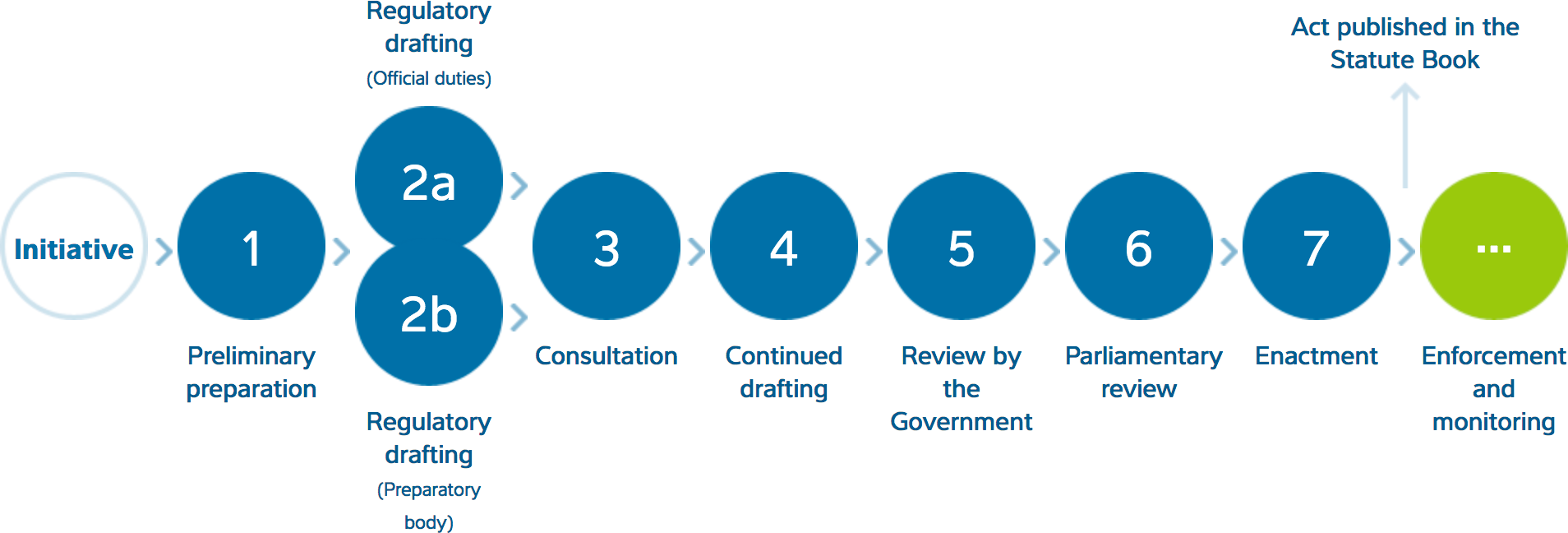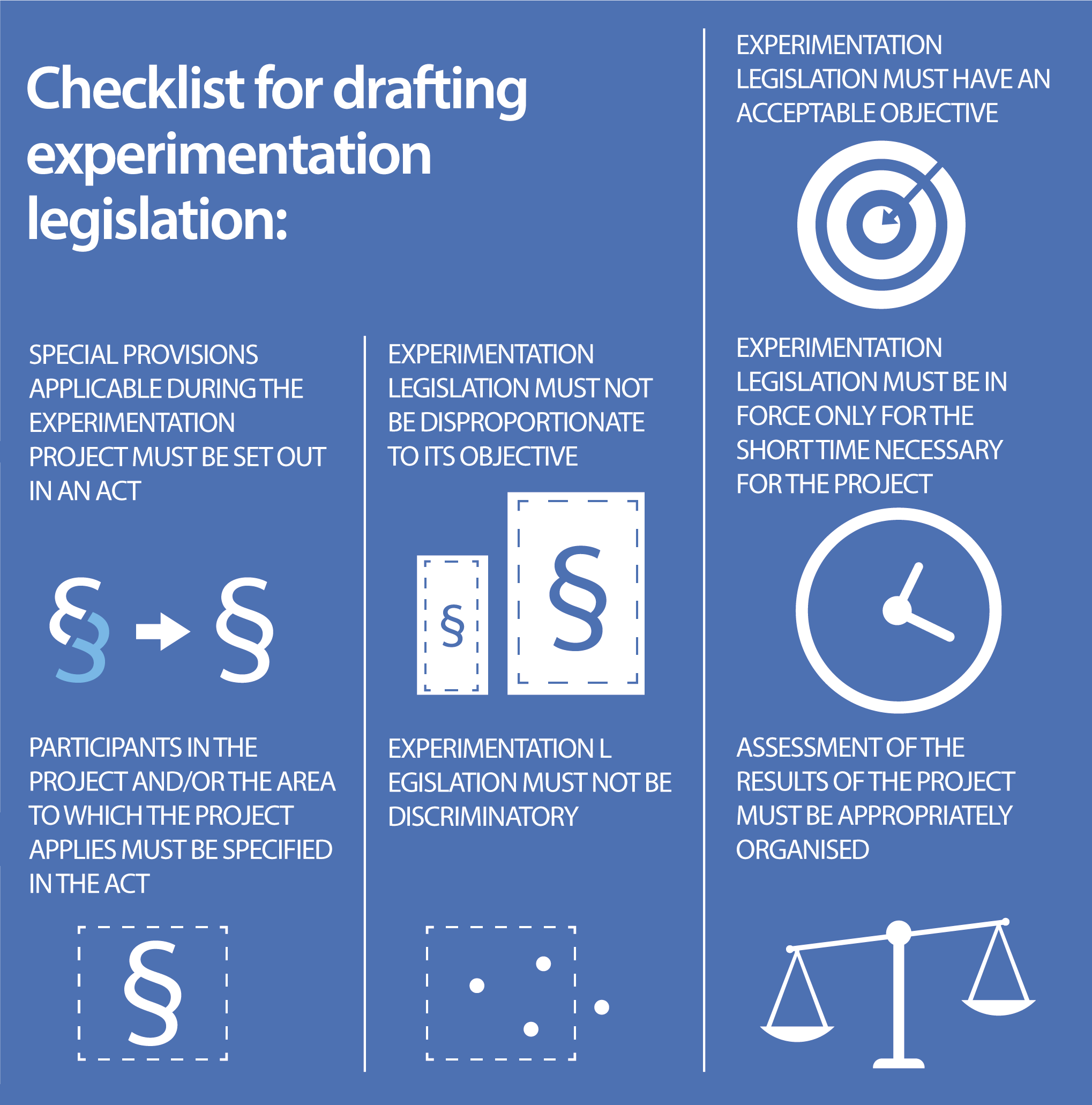Guide
Things to consider when drafting legislation enabling experimentation projects
General information about law drafting
Compliance with good law drafting practice means that the prospective impacts of a legislative proposal have been assessed, the relationship to other legislation has been examined, and different stakeholders have been informed of the project and given an opportunity to express their opinion on the proposal. A fundamental requirement inherent in the law drafting process is that the activities to be regulated must be in compliance with the Constitution – they must treat citizens on equal terms, ensure equal legal protection for all, and must not provide undue advantage to anyone at the cost of someone else or violate anyone’s fundamental rights.
In order to obtain reliable information on the impacts of different choices in society we may have to treat people on unequal terms and thus deviate from the formal principle of equality. A credible social experiment with results that are meaningful for the development of high-quality law drafting and policies will be one that is built and conducted on a sound research basis and whose risks have been assessed. In the design of research-based experiments, research ethics must be taken into consideration, quality must be ensured and the legal parameters must be properly in place (see report published by the Prime Minister’s Office on 21 September 2017). The report, drawn up as a collaborative effort by a large group of experts, focuses especially on social experiments, such as the basic income experiment. In addition to ethical guidelines, the report provides practical instructions on how to plan and implement a high-quality research experiment and, as such, it is recommended reading for everyone planning experimentation projects.
Experimental schemes, trials and pilots do not essentially differ from other high-quality research. For example, the same ethical principles must be observed. The Finnish Advisory Board on Research Integrity defines the ethical principles to be observed in anthropological research in Finland. Researchers using anthropological research methods are bound by the Board’s ethical guidelines for the responsible conduct of research These guidelines also provide answers to most of the ethical questions related to social experiments.
Preliminary preparation is the first step in the legislative drafting process (1). This stage involves an evaluation of the need to launch a legislative project in the first place. This is also a decision that needs to be made when considering whether to launch an experimentation project. Can the project be conducted without legislative amendments or does its execution require the enactment of separate experimentation legislation? The experimentation project, on the other hand, will produce reliable information to be utilised in law drafting projects that may be launched after the project has been carried out. Therefore, it is important to determine why the experimentation project is necessary, what exactly is the focus of the project, what are the specific issues on which experiential knowledge is needed, how this knowledge would be obtained, what procedure would be used to analyse the information, how the results would be reported, and so on. Answers to questions of this kind often also provide an answer to the question of whether the experiment requires the enactment of a separate act or whether it can be undertaken without any legislative amendments by, for example, modifying certain practices, informing the parties concerned or providing training.

If new legislation is needed, it must be drafted in compliance with good law drafting practice and the guidelines on law drafting. It must also be kept in mind that preparation of basic legislation that is important in principle and of significance for the functioning of society requires more from the law drafters than preparation of a smaller-scale legislative project. The principles of good law drafting that must be adhered to are, however, always the same:
- law drafting must be based on reliable and accurate information
- law drafting must be open and transparent
- the practical drafting work must be carried out by professional and competent public officials
- the political guidance and direction of the drafting process must be timely
- a law drafting project must be carried out in a manner that is appropriate in regard to the nature of the matter
- enough time must be reserved for the drafting process, as required by the complexity of the matter, and
- sufficient resources must be allocated for the drafting.
This guide, together with the Bill Drafting Instructions and Lainkirjoittajan opas (‘Guide for law drafters’), provides a good foundation for the drafting of individual statutes enabling experimentation projects in society.
Compliance with the principles of good law drafting practice also helps ensure that the design of an experiment is of high quality and ethically sound and will provide reliable information. Thus, observance of good law drafting practice supports the achievement of the social objectives of experimentation projects.
Experimentation, rule of law and equality

The exercise of public powers must be based on law. When experimentation projects are being planned, it is essential to remember that public authorities must not deviate from the requirements of the law in any of their activities or other exercise of public power, even for the purpose of experimentation, unless this is provided by law. In accordance with the principle of the rule of law, laid down in section 2 of the Constitution, the law shall be strictly observed in all public activity.
An experimentation project is usually targeted at a limited group of people. This is why the constitutional right of equality is an issue that needs to be taken into consideration when planning such projects.
Under section 6, subsection 1 of the Constitution, everyone is equal before the law. The provision expresses not only a requirement for de jure equality but also the idea of de facto equality. The provision also prohibits arbitrary treatment and requires that no one shall be treated differently without an acceptable reason.
Compliance with the equality provision also applies to law drafters. Legislation cannot arbitrarily place people or groups of people in a more or less favourable position in relation to others. The equality provision does not, however, require that all people be treated similarly in all respects, unless the circumstances affecting the matter are the same. Equality aspects are of significance and must be taken into consideration both when legislation provides benefits and rights to people and when it imposes obligations on them. On the other hand, it is typical of legislation to treat some people differently from others in order to achieve a certain acceptable social goal and to promote de facto equality.
It will be possible to conduct an experimentation project if
- the experimentation project has an acceptable objective
- the provisions deviating from other legislation that are to be applied during the experimentation project are laid down by an act
- the legislation enabling the experimentation project is proportionate
- the participants in the experimentation project and/or the area to which the experimentation applies are specified in the act
- the legislation enabling the experimentation project is not discriminatory
- the experimentation legislation is in force only for the short time that is necessary for this, and
- assessment of the results of the experimentation project is appropriately organised.
Experimentation project must have an acceptable objective
 From the perspective of equality, legislation enabling experimentation projects will usually be considered acceptable even if it places people in a slightly unequal position, provided that the experimentation project has a demonstrably acceptable objective.
From the perspective of equality, legislation enabling experimentation projects will usually be considered acceptable even if it places people in a slightly unequal position, provided that the experimentation project has a demonstrably acceptable objective.
Provisions enabling the experimentation project must be laid down by an act
 The requirement that provisions must be laid down by an act is generally applicable to the regulation of fundamental rights and is emphasised in the case of legislation of an experimental nature. Provisions deviating from other legislation that are to apply during an experimentation project must be laid down by an act.
The requirement that provisions must be laid down by an act is generally applicable to the regulation of fundamental rights and is emphasised in the case of legislation of an experimental nature. Provisions deviating from other legislation that are to apply during an experimentation project must be laid down by an act.
In regional experiments, the area to which the experimentation project applies must be specified in the act
 It may be possible to conduct an experimentation project only in certain municipalities or in other specified areas. In such cases, the act enabling the experimentation project must contain either explicit provisions on the area where the project is to be conducted or sufficiently detailed, binding criteria to be applied in the determination of the areas.
It may be possible to conduct an experimentation project only in certain municipalities or in other specified areas. In such cases, the act enabling the experimentation project must contain either explicit provisions on the area where the project is to be conducted or sufficiently detailed, binding criteria to be applied in the determination of the areas.
Criteria for determining participants in the experimentation project must be specified in the act
 An experimentation project may also be targeted at a restricted group of people. In such cases, the act enabling the experimentation project must lay down sufficiently detailed provisions on the criteria for determining the participants.
An experimentation project may also be targeted at a restricted group of people. In such cases, the act enabling the experimentation project must lay down sufficiently detailed provisions on the criteria for determining the participants.
Prohibition of discrimination
 The criteria for determining the participants in an experiment must not be discriminatory. The Constitution contains a general equality provision and also, in section 6, subsection 2, a provision prohibiting discrimination. Under this subsection, no one shall, without an acceptable reason, be treated differently from other persons on the grounds of gender, age, origin, language, religion, conviction, opinion, health, disability or other reason that concerns his or her person. The grounds listed in the provision can be regarded to form the core of the prohibition of discrimination. However, the list is not intended to be exhaustive – it is also prohibited to treat someone differently from others on the basis of other personal characteristics. Such characteristics could be, for example, social status, wealth, participation in the activities of an association, family relations, pregnancy, legitimacy of a child, sexual orientation, and place of residence.
The criteria for determining the participants in an experiment must not be discriminatory. The Constitution contains a general equality provision and also, in section 6, subsection 2, a provision prohibiting discrimination. Under this subsection, no one shall, without an acceptable reason, be treated differently from other persons on the grounds of gender, age, origin, language, religion, conviction, opinion, health, disability or other reason that concerns his or her person. The grounds listed in the provision can be regarded to form the core of the prohibition of discrimination. However, the list is not intended to be exhaustive – it is also prohibited to treat someone differently from others on the basis of other personal characteristics. Such characteristics could be, for example, social status, wealth, participation in the activities of an association, family relations, pregnancy, legitimacy of a child, sexual orientation, and place of residence.
Requirement of proportionality
 In the enactment of legislation enabling experimentation projects, attention must also be given to the principle of proportionality. Differences in the treatment of those who do and those who do not participate in a given experimentation project must not be unreasonable.
In the enactment of legislation enabling experimentation projects, attention must also be given to the principle of proportionality. Differences in the treatment of those who do and those who do not participate in a given experimentation project must not be unreasonable.
Limited period of validity
 The provisions enabling an experimentation project must be in force only for the short period necessary for the conduct of the project.
The provisions enabling an experimentation project must be in force only for the short period necessary for the conduct of the project.
Analysis of results must be appropriately organised
 A further general precondition for the conduct of an experimentation project is that the analysis and assessment of the results are organised appropriately.
A further general precondition for the conduct of an experimentation project is that the analysis and assessment of the results are organised appropriately.
